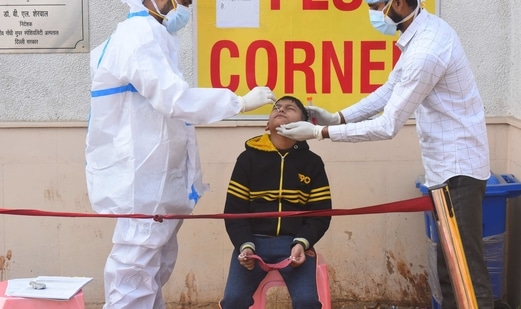‘Over half of city may have Covid antibodies’: Experts say after 5th sero-survey
The number was particularly high in the south-east district at 62%, the people said, and now appears to fall in a territory that experts believe is close to the herd immunity threshold.
At least half of Delhi’s population may have been exposed the Sars-Cov-2 virus, the latest serological study in Delhi suggests, with 56% of the 28,000 people sampled during a citywide survey testing positive for antibodies, according to people aware of the findings who asked not to be named.

The number was particularly high in the south-east district at 62%, the people said, and now appears to fall in a territory that experts believe is close to the herd immunity threshold. Herd immunity is when enough people have immunity – estimated to be 60-80% of the population in case of Sars-Cov-2 – to a disease that it leaves very few vulnerable people for it to spread to, slowing an outbreak.
“These figures are as per a preliminary report of the fifth round of serological surveillance that was submitted to the Delhi health secretary on Monday. The detailed report is likely to be submitted by researchers conducting the study from Maulana Azad Medical College by January 28,” one of the people added, asking not to be named. The survey was conducted between Jan 11 and Jan 21.
Experts said the survey’s results are in sync with infection trends seen in the Capital: the city went through its worst phase of the outbreak late October and early November, and the number of new infections has now plummeted to a level not seen since when Delhi was still in some form of a lockdown in the summer.
“A sero-prevalence of 56% would mean a good number of people in the city have been exposed to the infection. For an infection like Covid-19, it is thought that herd immunity would be achieved when there is a seroprevalence between 60 and 80%,” said Dr Puneet Mishra, professor of community medicine at the All India Institute of Medical Sciences (AIIMS).
To be sure, a mathematical model by the universities of Nottingham and Stockholm have shown that the number could be in the low 40s in the context of restrictions in place to slow the spread of Covid-19.
“Studies have shown that even in those without detectable amounts of antibodies, there is still some protection from the infection. What this means is the spread of the disease will be very slow and there is unlikely to be surge in cases in the near future. Especially with the vaccination drive now adding to the number of people protected against the disease,” Dr Mishra added.
The latest figure indicates an over 30 percentage point jump over the last sero survey that was conducted in October, before the city entered the third wave of infections.
Serological studies can be tricky to carry out and read, with sampling design and quality of kits holding a large influence on the outcomes. Scientists have also cautioned that herd immunity as a concept has not been studied in the context of natural infection, and only refers to protection brought on by vaccines.
“The concept of herd immunity does not hold when you talk about natural infection. Herd immunity is calculated as 1-1/R0 only in the case of vaccine-induced immunity. In case of a natural infection, anyone who is infected also passes it on to others, which is not the case with vaccinations. So talking about herd immunity in this case, when we don’t have a vaccine yet, will be a mistake,” said T Jacob John, former head of clinical virology at Christian Medical College, Vellore, shortly after the city’s second sero survey.
A particularly stark warning for Delhi could lie in the case of Manaus, a city in Brazil that was one of the hardest hit regions anywhere in the world, with its first peak in May. By mid-August, serological surveys suggested over 75% may have been infected and the city recorded a sharp turnaround with new infections reduced to a trickle.
But cases began rising by October and as of the first week of January, hospitals in Manaus were overflowing with patients.




